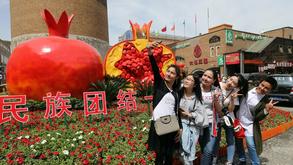 In this undated photo, visitors pose for a selfie at the entrance of the Xinjiang International Bazaar in Urumqi, capital of the Xinjiang Uygur autonomous region. (LI XIONGXIN / FOR CHINA DAILY)
In this undated photo, visitors pose for a selfie at the entrance of the Xinjiang International Bazaar in Urumqi, capital of the Xinjiang Uygur autonomous region. (LI XIONGXIN / FOR CHINA DAILY)
Western media's one-sided reporting on China's Xinjiang Uygur autonomous region-characterized by disinformation and false allegations-is fueling suspicions of an "orchestrated attack" aimed at stoking anti-China sentiment in some parts of the world, analysts said.
By leveling accusations of "forced labor" and "genocide" in Xinjiang without offering any hard evidence, media operators in the West appear to have taken on the task of furthering the interests of US-led Western powers against China, they added.
"When the (Western) mainstream media has pumped out an almost uniform position on Xinjiang... with virtually no content that offers a different perspective or nuance, it's hard to believe this is not an orchestrated attack," said Sameena Rahman, a Los Angeles-based peace activist and member of the Act Now to Stop War and End Racism Coalition protest group.
Rahman said the Western media's reporting on Xinjiang is not only one-sided but also has a "clear agenda of furthering the interests of the United States and other governments against China".
By leveling accusations of "forced labor" and "genocide" in Xinjiang without offering any hard evidence, media operators in the West appear to have taken on the task of furthering the interests of US-led Western powers against China, analysts said
"These Western interests include balkanizing China, promoting civil unrest through separatist sentiments and disrupting China's Belt and Road Initiative which passes through Xinjiang to the Global South," she said.
ALSO READ: Reports on Xinjiang suspected as plotted anti-China attack
Dina Yulianti Sulaeman, director of the Indonesia Center for Middle East Studies, said that the US uses the issue of Xinjiang to increase anti-Chinese sentiment in the world, noting that the US has never been "a defender of Muslims and has even dropped bombs on (Muslim-majority) countries".
"Why does the US, which over the past 20 years has dropped at least 326,000 bombs and missiles on countries in the Middle East and North Africa region, mostly Muslim-majority countries, suddenly become the defender of Muslims in Xinjiang?" she asked.
She cited Washington's disinformation campaign against Syria and how those efforts had provoked young Muslims worldwide to join extremist groups, as they felt there was a "massacre against Sunni Muslims".
The allegations against Xinjiang are part of an "economic war "being waged by the US against China, she said.
Early this year, the administration of then-US president Donald Trump banned imports of cotton, as well as related products, from Xinjiang over allegations of "forced labor" in the industry. China has repeatedly refuted those accusations, noting that cotton production in Xinjiang is highly mechanized and does not require a large number of cotton pickers.
Rahman said no one has found any hard evidence of "forced labor" in Xinjiang.
Mustafa Izzuddin, visiting professor at the international relations department of the Islamic University of Indonesia in Yogyakarta, questioned the calls for boycotts against Xinjiang cotton.
"Boycotts could result in a loss of jobs and a slowdown in the provincial economy of Xinjiang," he said.
READ MORE: Ban on Xinjiang cotton called anti-China ploy
Rene Pattiradjawane, chairman of the Indonesia-based Center for Chinese Studies and associate fellow at The Habibie Center in Jakarta, said the boycott of Xinjiang cotton will not resolve anything as "history tells us any sanction will certainly create other sanctions".
Also, he questioned the allegations of genocide committed against the Uygurs. "I don't believe (that there is) genocide in Xinjiang since any kind of genocide will be very difficult to conceal," he said.
Fact-checking urged
Rahman said the Western media need to do fact-checking before publishing reports on "genocide" in Xinjiang.
"One only needs to look at the statistical data to see that the population (in Xinjiang), and among Uygur people, is not only growing, but is growing at a disproportionately faster pace (than that) in the rest of China," she said.
The Uygur population in Xinjiang has been growing steadily for the past few years. From 2010 to 2018, it rose from 10.17 million to 12.72 million, the Xinhua News Agency said in a report. Also, the growth rate of the Uygur population-25 percent-was higher than the 13.99 percent growth rate recorded by the total Xinjiang population during the same period.
Rahman said reports on the alleged genocide in Xinjiang "trivialize the historical issue of genocide".
"The US government and the media are trying to invoke the images of the Nazi genocide against Jewish people and the death camps and apply that label falsely to China. I'm actually disgusted," she said.
READ MORE: 'Xinjiang genocide' claim a malicious lie
The US itself has a long history of forced labor and slavery, Rahman said, pointing out that the US uses prison labor, in some cases, to pick cotton.
The activist cited the example of the Louisiana State Penitentiary, which paid its inmates "abysmal wages" to pick cotton.
"They (prisoners) were paid 4 cents an hour in 2016," she said, noting that the rate is significantly lower than the US$7.25 per hour minimum wage that has been enforced in the US since 2009.
Contact the writers at prime@chinadailyapac.com


